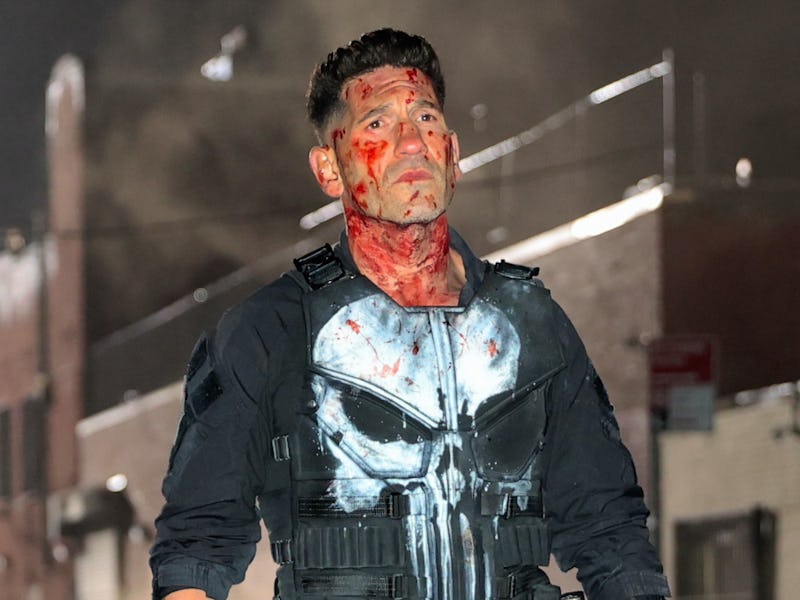Daredevil: Born Again Is Reclaiming Marvel’s Most Misunderstood Character
Can Daredevil: Born Again clean up the Punisher’s tarnished image?

The Punisher has returned — and he’s reclaiming what’s his. Jon Bernthal, best known for his role in Netflix’s Daredevil and its Punisher-centered spinoff, is officially transitioning into Marvel’s Cinematic Universe. He’s set to return in Daredevil: Born Again, and while the specifics of his role are still more or less a mystery, recent set images have already proven our most intriguing theories right.
Born Again is reportedly adapting the “Mayor Fisk” storyline from Daredevil comics. The Kingpin is going to war against the street-level vigilantes of New York — and it’s safe to assume he’s got a small army of dirty cops in his pocket. Behind-the-scenes images seem to tease a confrontation between the original Punisher and the newly-formed Anti-Vigilante Task Force. Its leader, NYPD Officer Cole North (Jeremy Earl) has spruced up his uniform with a familiar design: the Punisher’s white skull. His new look aligns with the most pervasive theories about Born Again, which suggested that corrupt cops would either be impersonating the anti-hero or co-opting his symbol altogether.
Daredevil: Born Again is finally tackling Marvel’s most pervasive real-world issue: the appropriation of the Punisher.
To say nothing of the accuracy of Cole’s new look (in the comics, the character harbors a hatred for all vigilantes, Punisher included), it does echo one of the Punisher’s most notable comic storylines. In 2019’s Punisher #13 by Matthew Rosenberg and Szymon Kudranski, the Punisher confronts a group of cops that are genuine fans of his outlaw attitude. “You showed [us] how it’s done,” one officer tells him. They believe in his mission. They’ve even got a Punisher decal on their squad car.
This doesn’t impress Punisher at all, as he believes that the police are meant to uphold the law and defend the innocent. The cops who idolize Punisher tend to be the same cops who persecute and kill without discretion, broadcasting their prejudice without fear of impunity. To align with his skewed morality, and to embrace his iconography, is to emulate the system’s worst injustices. To quote Gerry Conway, who created the Punisher back in the ‘70s, it’s akin to “putting a Confederate flag on a government building.”
This one-off story doesn’t go far enough in condemning a very real issue, but it was a step in the right direction. The appropriation of the Punisher has been a topic of conversation since American Sniper author Chris Kyle first adopted the character’s iconic skull motif, and Marvel has spent the past decade and change ignoring its ramifications. Born Again seems poised to change that, and there’s no better time to dig deeper into that conversation.
The Punisher #13 proved that Marvel is at least aware of the character’s shifting role in the zeitgeist. Why has it taken the studio so long to address the issue?
The Punisher has become synonymous with the worst of white nationalism. His symbol no longer belongs to him alone, but to the police force, the military, and Neo-nazis. The Punisher did what it could to distance the character from institutionalized violence, but illegal use of the Punisher Skull has only ramped up in recent years. Proud Boys proudly sported the symbol as they stormed the U.S. Capitol Building in 2021, while pro-cop clothing companies spliced the skull with Blue Lives Matter merch. It might be too late to fully reclaim the symbol, especially given the Punisher’s muddied moral compass. But at the very least, Born Again can hold a mirror up to those who’ve co-opted the character, and condemn their actions on a larger platform.
The only question now is whether Marvel can actually deliver a satisfying critique on such a thorny real-world topic. For all its efforts to bring political nuance to other corners of its cinematic universe, Marvel has never actually gotten it right. Every time the franchise gets close to tackling themes of imperialism or police brutality, it takes another two steps back. Projects like Black Panther: Wakanda Forever and The Falcon and the Winter Soldier seem determined to appease both sides in the pursuit of centrist catharsis, but that only adds insult to injury.
If you can’t stand up against bigotry, you might as well be condoning it: one needn’t look further than Marvel’s most complex anti-hero for evidence of the worst-case scenario. The studio has spent seven years in silence over the Punisher; hopefully it’s not too late to bring the character back from the fringes.